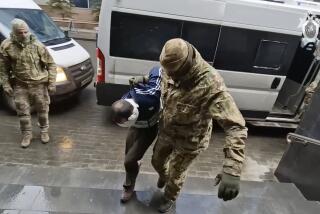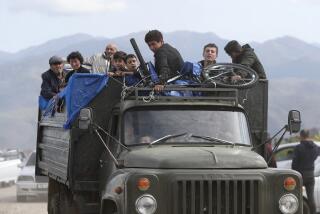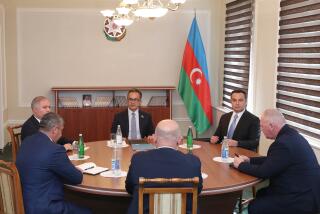Dissidents Rout Tajikistan’s Hard-Line Leader : Central Asia: He is reportedly holed up in Parliament. Foes control most of the capital.
MOSCOW — Tajiks opposing their republic’s hard-line ex-Communist leader took control of his residence and most of their capital Wednesday after a violence-marred night in which the chief of the presidential guard dramatically defected to their side.
Rakhman Nabiyev, Tajikistan’s president, was nowhere to be found in the presidential palace, and his foes said he was holed up in the Parliament building, protected by hundreds of supporters with automatic weapons.
Reports from the Tajik capital of Dushanbe, although conflicting in some degree, made it clear that forces loyal to Nabiyev, 61, had lost control of the fast-moving events.
Opposition circles began forming a “State Committee of National Salvation,” apparently to assume power, and issued a televised call to Nabiyev to enter negotiations for electing a new coalition government of “national concord” that would include Tajikistan’s top Muslim cleric.
The standoff, however, could be far from over. Anti-presidential forces reportedly had to give up the airport late Wednesday and were repelled by elite police units when they attempted to storm the radio station in armored personnel carriers. They occupied the TV studios the previous day.
The landlocked, mountainous Central Asian land was one of the poorest Soviet republics and the only one to elect an old-style party boss as its president. Nabiyev, a Communist stalwart, was pushed into retirement soon after ex-Soviet President Mikhail S. Gorbachev came to power in 1985.
But independence and the end to the Kremlin’s domination allowed Nabiyev and like-minded party leaders to make a stunning comeback. He won 58% of the vote in an eight-candidate presidential election last November that his opponents said was marred by fraud. A bitter political feud began.
The opposition, a loose coalition of half a dozen liberal and Muslim parties, has demanded the resignation of the new country’s political upper crust as well as economic reforms.
The current crisis erupted when Nabiyev reneged on pledges he reportedly made to liberals and reinstated hard-line parliamentary chairman Safarali Kenjayev on Sunday.
Violent clashes erupted Tuesday after five weeks of street protests in Dushanbe. Vitaly Arakhelov, a police duty officer, said by telephone that there were three confirmed deaths and 20 injuries in brawls and shootouts.
Rumors put the death toll as high as 64, and Arakhelov said some Tajiks may have buried their dead without first taking the bodies to a hospital.
The local garrison of armed forces--formerly Red Army, now under control of the Commonwealth of Independent States--was staying out of the conflict, judging it a purely internal affair. Even the kaziat , or local Muslim religious hierarchy, and regular police commanders appeared to be doing nothing to salvage Nabiyev’s rule.
Although authorities in Russia also seemed to be observing a scrupulous neutrality, they took precautions so that the current turmoil in Afghanistan, a country with a large Tajik population that borders on Tajikistan, would not cross the border and affect events in Dushanbe.
Border guards in Tajikistan were being reinforced to prevent any penetration of “large lots” of weapons from Afghanistan, Col. Alexander Suvorov, chief of the press center of the Commonwealth border troops, said in Moscow. Local troops reported no trouble on the frontier.
The turning point in Dushanbe may have come when Maj. Gen. Bakhrom Rakhmonov, commander of the recently created Tajikistan national guard and former presidential adviser on defense affairs, went over to the opposition. He told the Interfax news agency that he wants to avoid senseless bloodshed.
Said Umarov, spokesman for the opposition Democratic Party of Tajikistan, reported that about 2 a.m., pressed by crowds, Rakhmonov disbanded the presidential guard of 168 soldiers. They left their weapons behind and meekly went home.
Umarov said Nabiyev is now being protected by 1,700 men, most of them armed with Kalashnikov assault rifles, at the barricaded Supreme Soviet building near Ozodi Square.
To protect his increasingly contested rule, Nabiyev had imposed a state of emergency and a 9 p.m.-to-5 a.m. curfew on Tuesday. Government radio urged Tajiks, an ethnic group closely related to Iranians, to defend their hearths, families and workplaces in what observers said sounded like an appeal to form vigilante squads.
Nabiyev loyalists were rallying in Ozodi Square, where orators vowed to defend the constitutional order.
Meanwhile, opposition leaders used the captured television to urge the populace to remain calm and ask the large Russian community to remain neutral.
Izvestia, a respected Moscow daily newspaper, said the political rivalry for Tajikistan had turned into a “civil war.” Many streets in the city of 580,000 people were blocked by barricades or pickets.
Sergei Loiko, a reporter in The Times’ Moscow bureau, contributed to this report.
More to Read
Sign up for Essential California
The most important California stories and recommendations in your inbox every morning.
You may occasionally receive promotional content from the Los Angeles Times.










